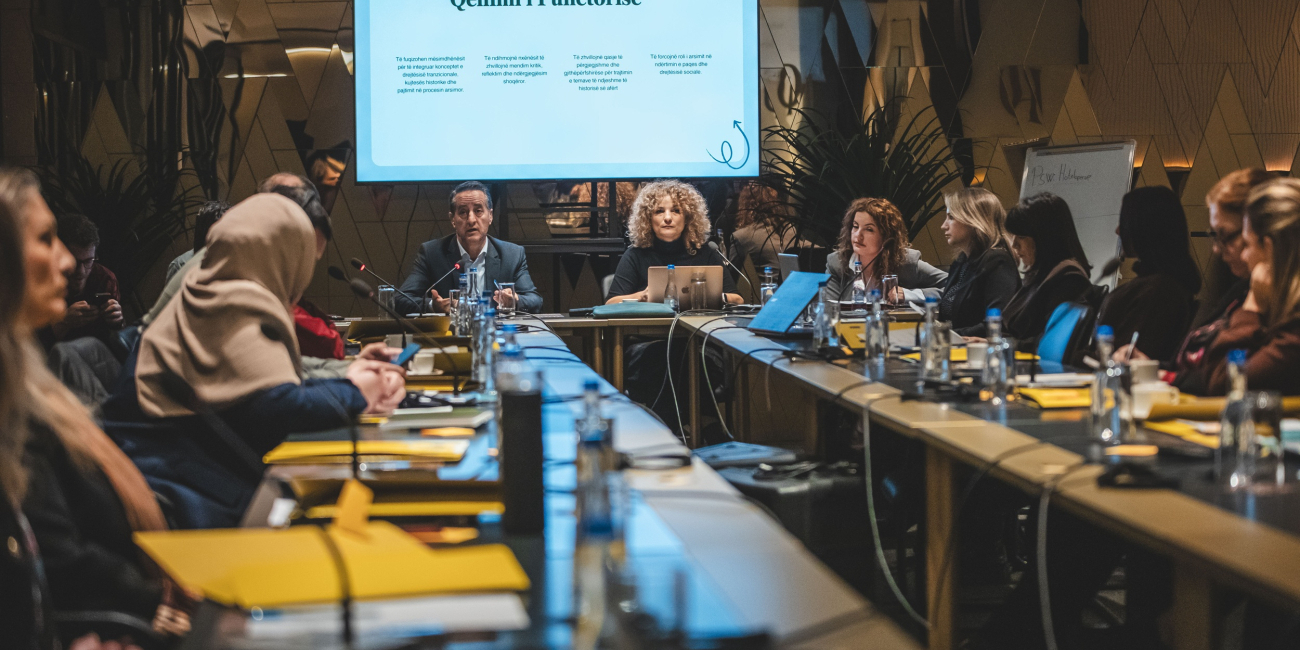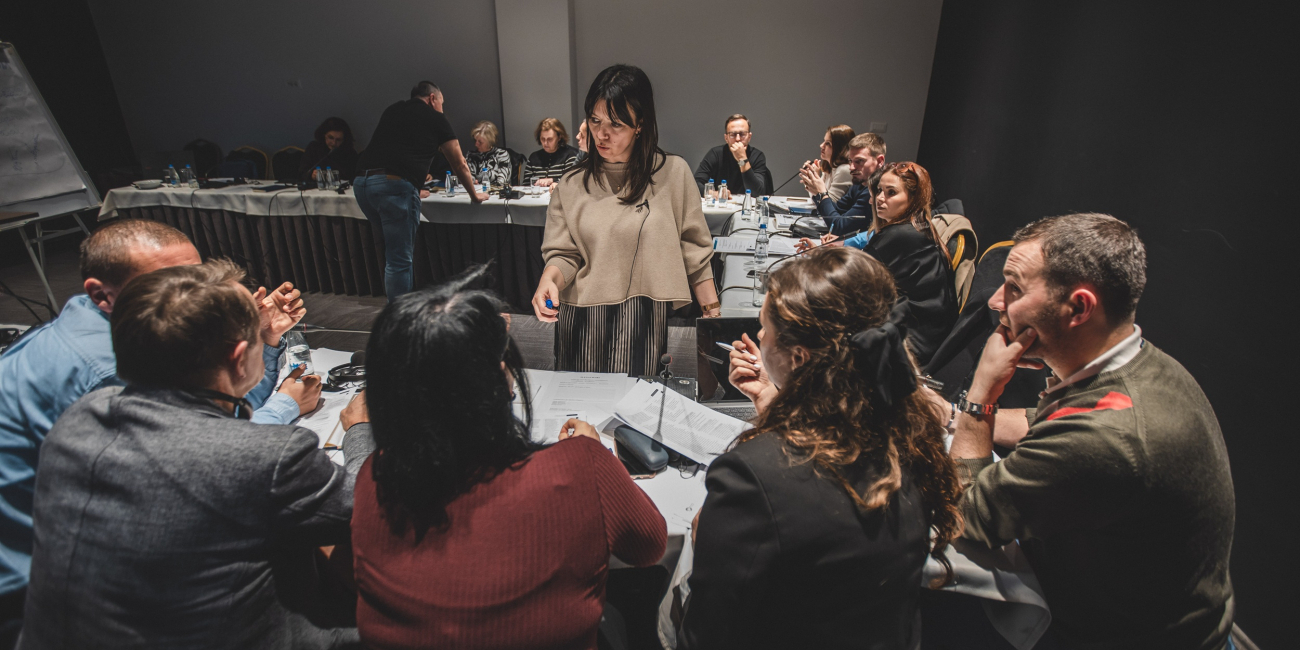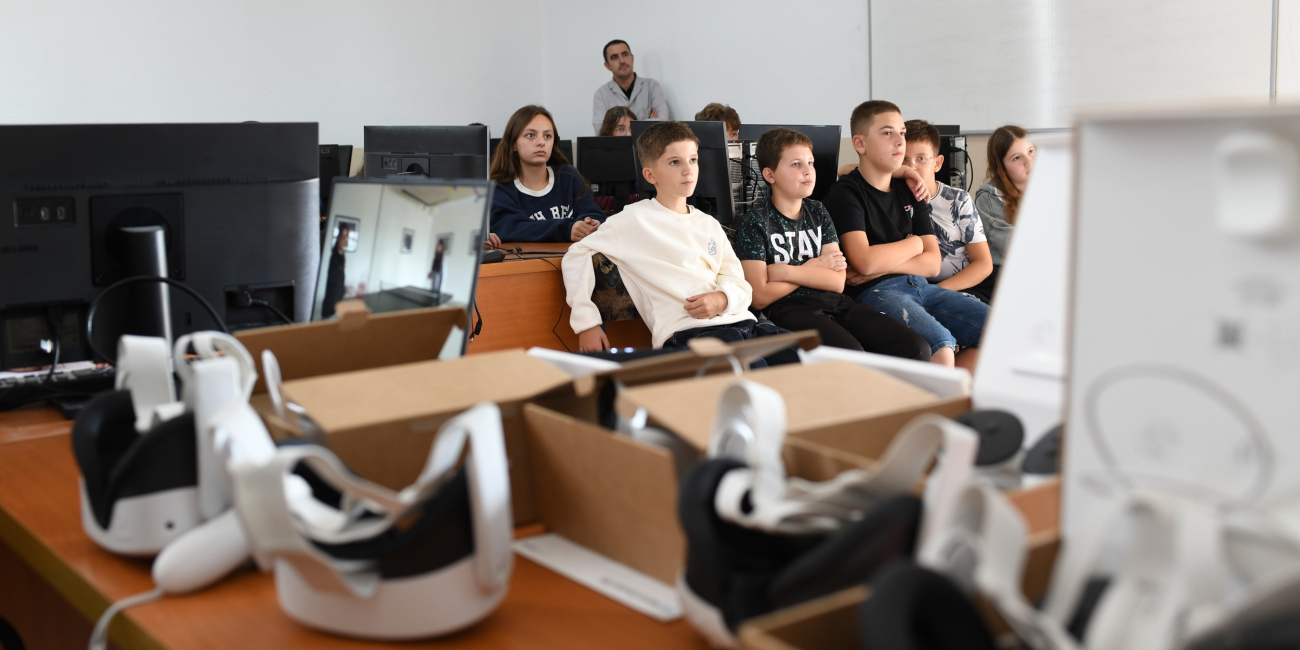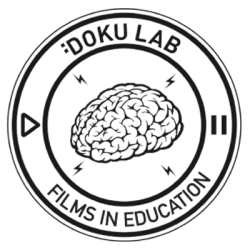DokuFest, in collaboration with the Humanitarian Law Center Kosovo, successfully conducted a series of teacher training workshops within the project…
Për qasje të plotë në Bibliotekën Digjitale ju duhet llogari aktive në DokuLab
THE THIRD INTERCULTURAL EXCHANGE CAMP
All that transpired in the 7-day unforgettable journey for the participants of our third Intercultural Camp!
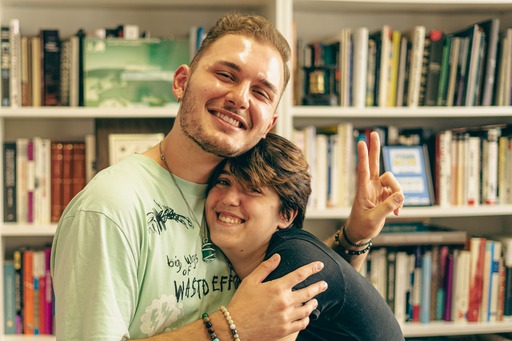 A bit about the Intercultural Exchange Camp within the ‘How Do I See You?’ project:
The Intercultural Fall Camp is the 3rd out of the 6 planned intercultural exchange camps within the framework of the ‘How Do I See You?’ project, in collaboration with Slobodna Zona and funded by the European Union. The camps are made for intercultural ideas and opinions to be exchanged amongst the participants. In addition, the camp’s focus is to educate its participants on media, namely media disinformation, and above all where they will find common goals and reflect their opinions through interviews in which they will have the opportunity to express their own views, to their peers.
In an age where media is being largely instrumentalized by political regimes to showcase a skewed reality of the world and ultimately one another, the best way to know the truth is to see it for yourself.
As per DokuFest's restless effort to implement film for its educational purposes, the audio-visual content created from the camp serves as a medium that narrows down the lens to the individual truths of the participants, breaking away from the one-dimensional ways of seeing one another, for the participants as well as anyone who gets to witness the unconventional audio-visual interviews produced from these camps, running at the exhibition throughout the festivals in Prizren and Belgrade, each year. We say unconventional as the pairings participating in the interviews ask each other questions in their mother language, able to communicate through the simultaneous translation coming from their headsets. The questions they ask one another circulate around their impressions of each other in the beginning and after 7 days full of activities that lay down the grounds to engage in meaningful conversation.
All that transpired at the Intercultural Fall Camp:
Their journey started at the Slobodna Zona headquarters, FundB97, a center they kept revisiting to meet with activists to talk about how they implement activism in their different lines of work, and would continue to visit staples of Belgrade such as the Museum of the Yugoslavia Film Archive and the Museum of Yugoslavia, in between of these meetings. The third day of the study visist, they took off to Novi Sad. There, amid visits to local scale activist centers, they were divided in pairs to collaboratively create short videos.
“I know it’s only been one week, but it feels like I’ve known every one of you for a year” is what Lejla Elezi, a third-time participant in the camps, had to say about her experience.
Below you can find descriptions of the activities that transpired each day of the third Intercultural Exchange Camp in Belgrade:
DAY 1
The Kosovar participants made their way to Belgrade on the 5th of September. On that very same day, they were welcomed by two investigative journalists Tanja Maksic and Radimlo Markovic at ‘BIRN’ (Balkan Investigative Reporting Network) at Fund B92. The journalists shared their experiences and hardships of working in their line of work in a country where media is largely instrumentalized by political regimes.
A bit about the Intercultural Exchange Camp within the ‘How Do I See You?’ project:
The Intercultural Fall Camp is the 3rd out of the 6 planned intercultural exchange camps within the framework of the ‘How Do I See You?’ project, in collaboration with Slobodna Zona and funded by the European Union. The camps are made for intercultural ideas and opinions to be exchanged amongst the participants. In addition, the camp’s focus is to educate its participants on media, namely media disinformation, and above all where they will find common goals and reflect their opinions through interviews in which they will have the opportunity to express their own views, to their peers.
In an age where media is being largely instrumentalized by political regimes to showcase a skewed reality of the world and ultimately one another, the best way to know the truth is to see it for yourself.
As per DokuFest's restless effort to implement film for its educational purposes, the audio-visual content created from the camp serves as a medium that narrows down the lens to the individual truths of the participants, breaking away from the one-dimensional ways of seeing one another, for the participants as well as anyone who gets to witness the unconventional audio-visual interviews produced from these camps, running at the exhibition throughout the festivals in Prizren and Belgrade, each year. We say unconventional as the pairings participating in the interviews ask each other questions in their mother language, able to communicate through the simultaneous translation coming from their headsets. The questions they ask one another circulate around their impressions of each other in the beginning and after 7 days full of activities that lay down the grounds to engage in meaningful conversation.
All that transpired at the Intercultural Fall Camp:
Their journey started at the Slobodna Zona headquarters, FundB97, a center they kept revisiting to meet with activists to talk about how they implement activism in their different lines of work, and would continue to visit staples of Belgrade such as the Museum of the Yugoslavia Film Archive and the Museum of Yugoslavia, in between of these meetings. The third day of the study visist, they took off to Novi Sad. There, amid visits to local scale activist centers, they were divided in pairs to collaboratively create short videos.
“I know it’s only been one week, but it feels like I’ve known every one of you for a year” is what Lejla Elezi, a third-time participant in the camps, had to say about her experience.
Below you can find descriptions of the activities that transpired each day of the third Intercultural Exchange Camp in Belgrade:
DAY 1
The Kosovar participants made their way to Belgrade on the 5th of September. On that very same day, they were welcomed by two investigative journalists Tanja Maksic and Radimlo Markovic at ‘BIRN’ (Balkan Investigative Reporting Network) at Fund B92. The journalists shared their experiences and hardships of working in their line of work in a country where media is largely instrumentalized by political regimes.
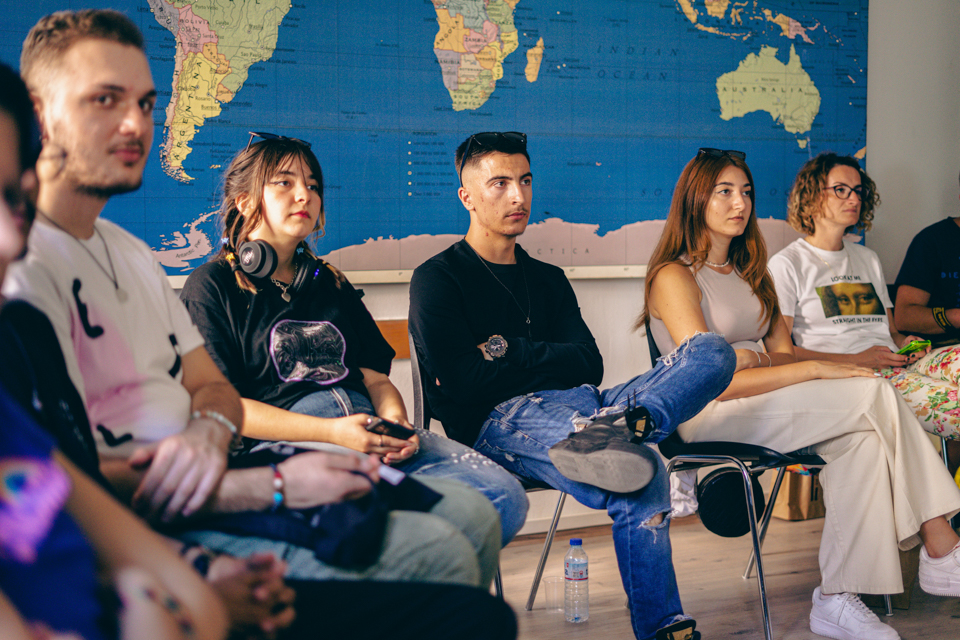 DAY 2
The second day of the camp was dedicated to the ‘Yugoslav Film Archive’, a much-anticipated visit for the film enthusiasts of the group. The participant visited two of the institutions of the archive, the Archival facility itself, and the Museum of the ‘Yugoslav Film Archive’, with permanent exhibitions of everything film during the Yugoslavian era. At the Yugoslav Film Archive, the participants got to see how films are archived, preserved, and digitized and even learn about the process of collecting them.
DAY 2
The second day of the camp was dedicated to the ‘Yugoslav Film Archive’, a much-anticipated visit for the film enthusiasts of the group. The participant visited two of the institutions of the archive, the Archival facility itself, and the Museum of the ‘Yugoslav Film Archive’, with permanent exhibitions of everything film during the Yugoslavian era. At the Yugoslav Film Archive, the participants got to see how films are archived, preserved, and digitized and even learn about the process of collecting them.
_1.jpeg) DAY 3
The day started at the Museum of Yugoslavia, a staple of Belgrade and a must-see to truly understand the history of the country. In the afternoon the participants met with documentarians and activists, Dušan Šaponja and Dušan Čavić at Fund B92. They talked about their personal experiences of producing independent art and navigating the challenges that come with it.
DAY 3
The day started at the Museum of Yugoslavia, a staple of Belgrade and a must-see to truly understand the history of the country. In the afternoon the participants met with documentarians and activists, Dušan Šaponja and Dušan Čavić at Fund B92. They talked about their personal experiences of producing independent art and navigating the challenges that come with it.
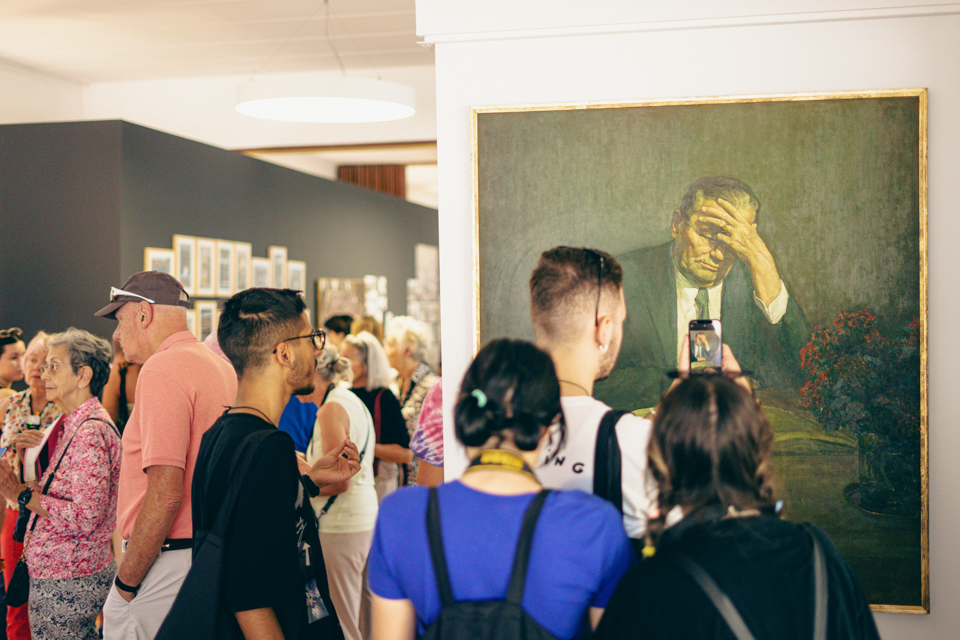
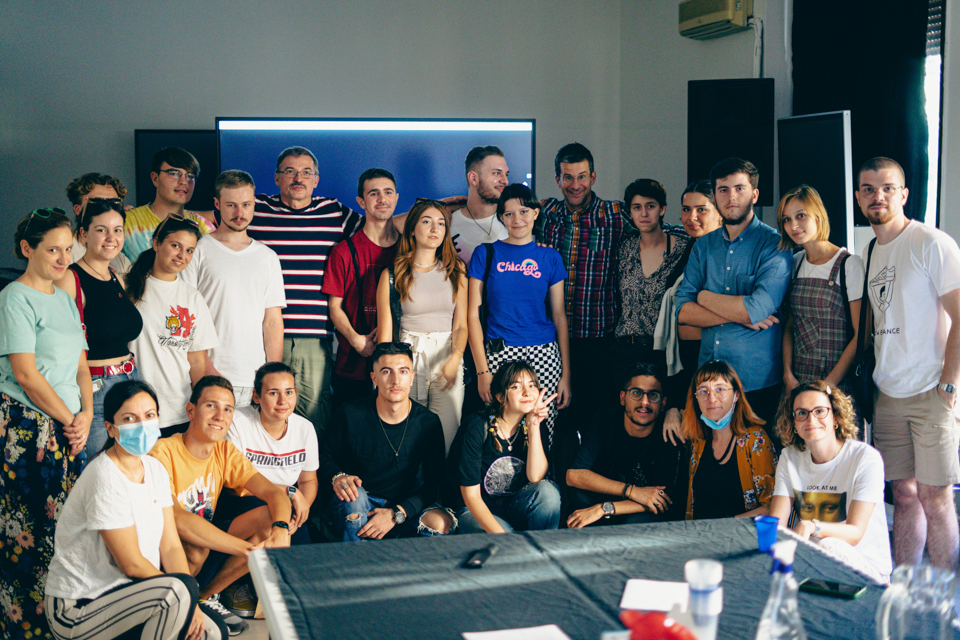 DAY 4
On the fourth day of the study visit, the participant headed to Novi Sad. Upon their arrival, they were welcomed by activist and independent media representative, Daško Milinković. The meeting with Daško, made for an unconventional gathering of its kind, as the meeting was conducted outdoors at some of the main attractions in Novi Sad such as the Novi Sad fortress.
The participants got to enjoy the nice weather and landscape of the city all while talking about the political scene of Kosovo and Serbia, the so-called internet echo chamber that perpetuates our belief systems, and its effect on the Kosovo and Serbia negotiations.
In the evening they visited Festival 'Novo Kulturno Naselje', which is a local scale initiative. The organizations' initiatives and various activities inspire the inhabitants to create a program and participate in it – not as onlookers, but as active participants and organizers. The participants reported having felt inspired to take action from the in-depth talk with one of the organizers.
DAY 4
On the fourth day of the study visit, the participant headed to Novi Sad. Upon their arrival, they were welcomed by activist and independent media representative, Daško Milinković. The meeting with Daško, made for an unconventional gathering of its kind, as the meeting was conducted outdoors at some of the main attractions in Novi Sad such as the Novi Sad fortress.
The participants got to enjoy the nice weather and landscape of the city all while talking about the political scene of Kosovo and Serbia, the so-called internet echo chamber that perpetuates our belief systems, and its effect on the Kosovo and Serbia negotiations.
In the evening they visited Festival 'Novo Kulturno Naselje', which is a local scale initiative. The organizations' initiatives and various activities inspire the inhabitants to create a program and participate in it – not as onlookers, but as active participants and organizers. The participants reported having felt inspired to take action from the in-depth talk with one of the organizers.
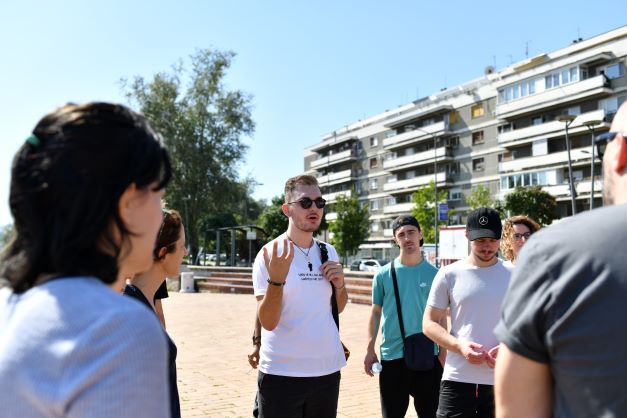
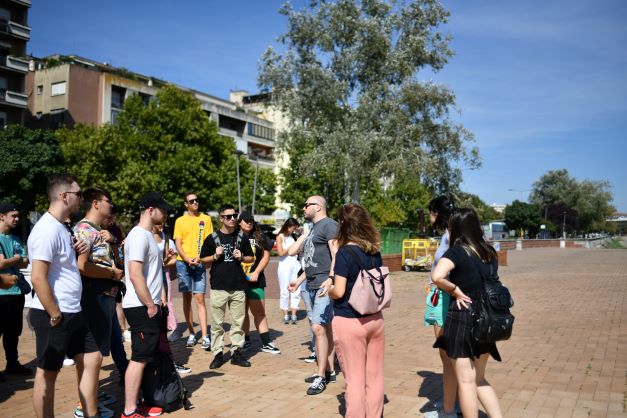 DAY 5
On the 5th day of the camp, making it the second day in Novi Sad. The visit naturally found the participant at eco camp, Šodroš. The eco-camp is an embodiment of perseverance to protect a habitat so significant to the city, against entities that see it as a vacant space to utilize for profit. The eco-camp is home to thousands of native animals that would have otherwise been destroyed if it were not for the camp's organizers. Another activity that displayed the in and outs of what it takes to take action.
Later that day the participants visited an interactive art exhibition called ‘The Dark Room’, in the creative district of Novi Sad, a district built on the occasion of Novi Sad being announced as the European Capital of Culture.
DAY 5
On the 5th day of the camp, making it the second day in Novi Sad. The visit naturally found the participant at eco camp, Šodroš. The eco-camp is an embodiment of perseverance to protect a habitat so significant to the city, against entities that see it as a vacant space to utilize for profit. The eco-camp is home to thousands of native animals that would have otherwise been destroyed if it were not for the camp's organizers. Another activity that displayed the in and outs of what it takes to take action.
Later that day the participants visited an interactive art exhibition called ‘The Dark Room’, in the creative district of Novi Sad, a district built on the occasion of Novi Sad being announced as the European Capital of Culture.
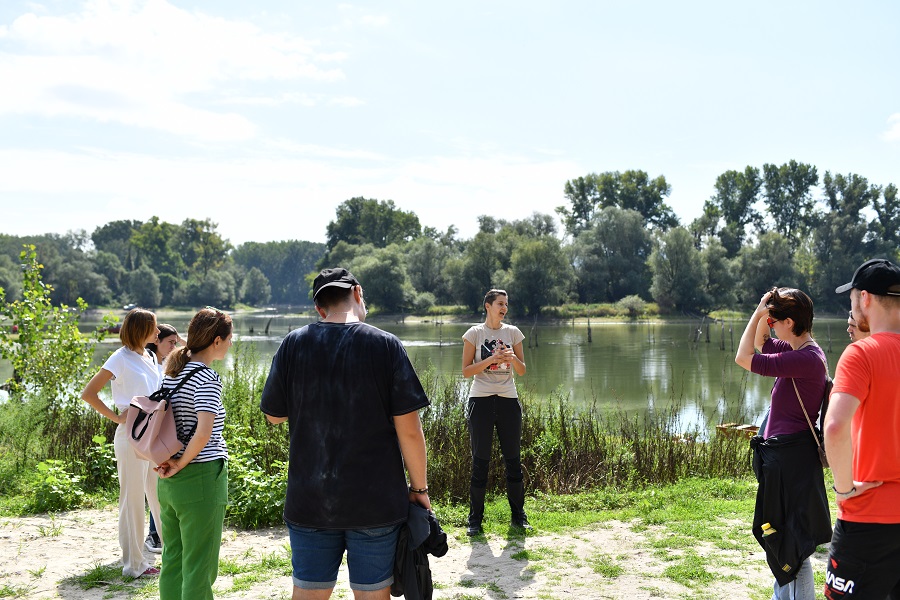
 DAY 6
On the 6th and final day before our participant left for Kosovo on the 11th, the filmings of interviews for the audio-visual exhibition of the project started at Fund B92. The videos conducted are the materials for the audio-visual exhibitions of the project set to be displayed at the Slobodna Zona Festival in November of this year. The participants were paired into twos, one Serbian & one Kosovar, and were filmed having a conversation with each other, each in their native language. Connected to equipments that would simultaneously translate what they were saying to each other, the interview made for an interesting audio-visual experience.
The camp concluded with a farewell party and screenings of Fond B92 films at The Social Center 'October'.
DAY 6
On the 6th and final day before our participant left for Kosovo on the 11th, the filmings of interviews for the audio-visual exhibition of the project started at Fund B92. The videos conducted are the materials for the audio-visual exhibitions of the project set to be displayed at the Slobodna Zona Festival in November of this year. The participants were paired into twos, one Serbian & one Kosovar, and were filmed having a conversation with each other, each in their native language. Connected to equipments that would simultaneously translate what they were saying to each other, the interview made for an interesting audio-visual experience.
The camp concluded with a farewell party and screenings of Fond B92 films at The Social Center 'October'.
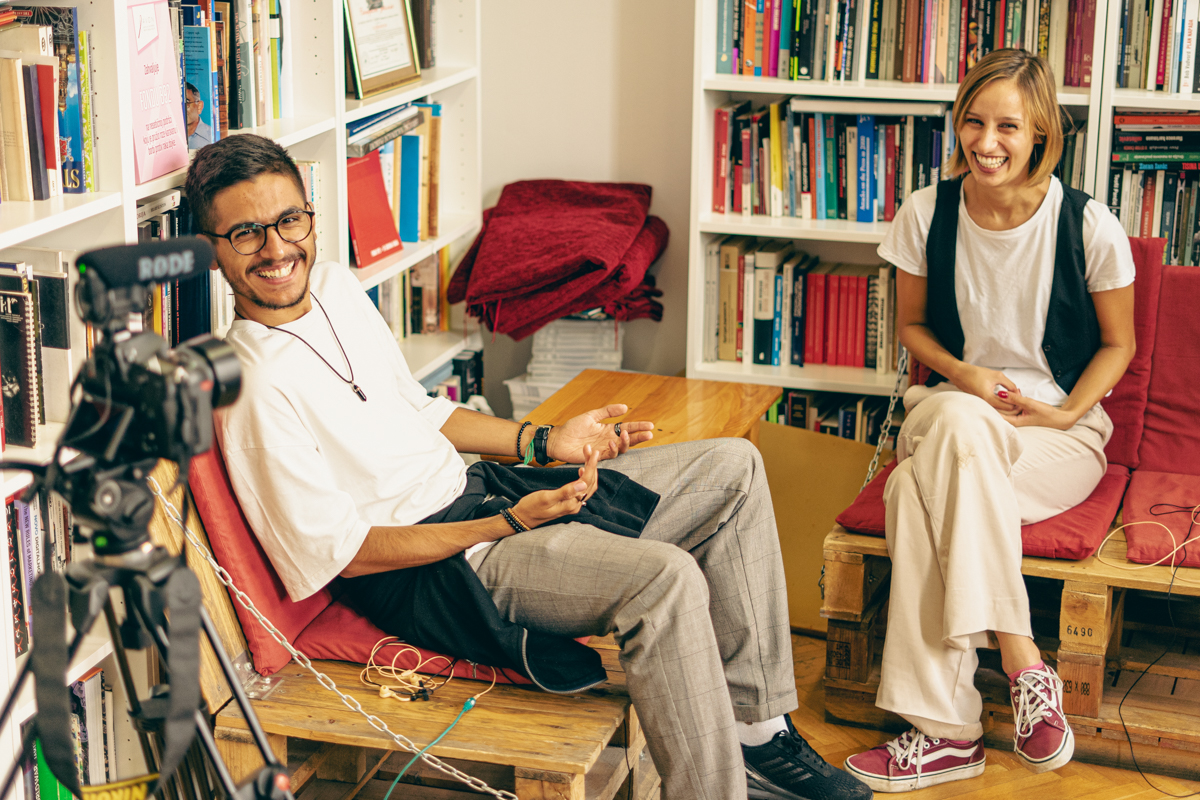 DAY 7
Take off to Kosovo!
To watch all the videos created from participants of Group 4, click here
This grant is funded by the European Union and implemented by DokuFest and Foundation Fund B92
DAY 7
Take off to Kosovo!
To watch all the videos created from participants of Group 4, click here
This grant is funded by the European Union and implemented by DokuFest and Foundation Fund B92


